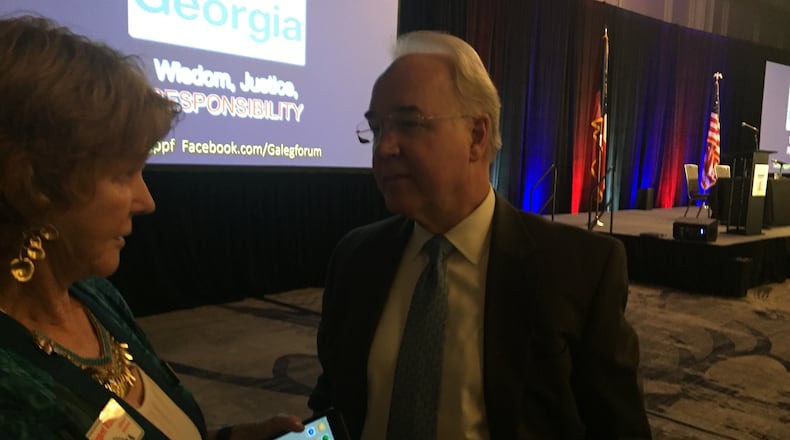Former U.S. Health and Human Services Secretary Tom Price returned to the political public eye in Georgia on Friday, weighing in on the state’s plans around Medicaid.
Displaying what a Democratic critic recently called his political “chops,” the deeply conservative Price seemed in perfect agreement with Grady Memorial Hospital’s CEO, John Haupert, as the two discussed the need to mold Medicaid to help fund care for Georgia’s poor.
“The challenge is real,” Price said. “Thirteen percent of the population is still uninsured in this state. … The only thing that’s truly holding our systems together is the altruism of the folks caring for the patients.”
Haupert described a pilot program where Grady poured resources into “surrounding” problem patients with new care including social workers. The patients quit overusing the emergency room, saving Grady money.
“That’s what you call a win-win-win,” Price said about Grady’s success.
Nearly a year after being ousted in an expense scandal from his Cabinet position in the administration of President Donald Trump, Price has reconnected in the Georgia political world and raised his voice on the politics of health care. He has joined the board of a politically connected health care company, Jackson Healthcare. His appearance Friday was a two-person panel with Haupert at the Georgia Public Policy Foundation's annual conference designed to influence the upcoming state legislative session.
Nationally, he’s been active, too: In the space of one month this spring he spoke to a conference in Chicago, then a conference in Washington, and then appeared on an hourlong podcast with David Axelrod, a former senior adviser to President Barack Obama.
Price on Friday would not address his current professional activities and was coy about future plans.
Would he be more in the public eye back home?
“I don’t know!” he said. “I’d have to get invited.”
What about running again for elective office?
He answered, still chuckling, “Have to get invited.”
Price and Haupert were at Friday’s forum to discuss what to do about Georgia’s health care woes, which include hundreds of thousands of poor who are not covered by Medicaid.
Liberals — with the support of 73 percent of the state's voters, according to an Atlanta Journal-Constitution poll in January — say the state should simply expand Medicaid to cover them as the Obamacare law intended. Price thinks that's a mistake, and instead, he supports a Medicaid "waiver" — a way the state could get some of that Medicaid money for the poor but waive standard requirements for how to use it in order to tailor its own program.
A waiver is gaining broad interest in the Legislature. But the question is what kind of waiver.
Price drew bitter opposition from liberals for supporting waivers that could revoke services, for example transportation to some non-emergency appointments for the poor, or result in removing people from Medicaid altogether. Under Price’s federal leadership, states began asking for waivers to impose work requirements on Medicaid recipients. Arkansas recently reported that thousands of poor are eligible to be kicked off of Medicaid there because of its new work requirement.
Price has occasionally drawn their derision for statements they took as confirmation they were right.
In May, he said the administration’s rollback of the Obamacare individual mandate would increase insurance prices for consumers, comments that went viral and were proved true. Price doesn’t deny that but says the important context is that the whole system requires comprehensive change, “like a balloon when you push in at one point, it pops out at another place.”
Speaking with Axelrod, Price said everyone should have coverage, just as when he was secretary he said everyone should have access to care. But for Price, that means choice: the choice to buy an insurance plan that may cover less than what you end up needing. Then the system should accommodate that in other ways, he said. Also speaking to Axelrod, he described Medicaid as an “incredible lifeline.” But, he added, it’s a failing business model.
Yet describing the problems, Price could sound like any advocate from any side of the aisle.
“The disparities are real. The disparities are real,” he stressed at the Friday event. “There’s a ZIP code that’s just a few miles from right here,” he described, with high mortality rates, disease incidence and “maternal and fetal distress.”
“And they are within blocks — blocks — of some of the finest health care institutions that we have in this region and this state and truly in this nation,” Price said, adding that “it’s incumbent upon policymakers to ask the question why.”
“I think Georgia could be a leader in a big way,” Price said. “We’ve got the size of population and the size of the challenged population that allows us to do remarkable things.”
Stay on top of what’s happening in Georgia government and politics at ajc.com/politics.
About the Author
Keep Reading
The Latest
Featured





